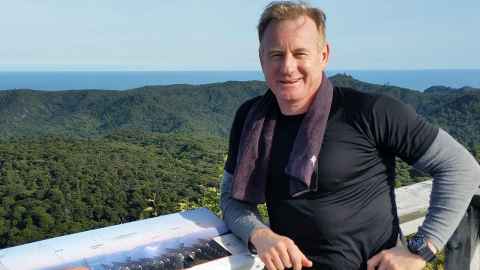Kris Vette: with Covid-19, let's focus on science
19 June 2020
Opinion: Kris Vette has dealt with challenges caused by a pandemic before. He says the problem with the Covid-19 pandemic is that we haven’t learnt many lessons from the past.

Widespread pandemics have hit civilisation about once every 80 years or so since ancient times. The first recorded pandemic, the Plague of Athens, occurred around 426 BCE. In December 2019, as if to mark the centenary of the devastating 1918 ’flu pandemic, a ‘pneumonia of unknown origin’ emerged in central China.
Despite warnings from prominent figures and scientists over the past decade, most countries had made little progress with pandemic preparedness and there were almost no vaccine platforms (building block vaccines) in place that would have allowed rapid vaccine development from previously advanced work. Adding to these failures, the outbreak was downplayed by many commentators. The opportunity to ‘spool-up’ organised responses in those first couple of months was lost.
New Zealand is fortunate in having a public health specialist as Director-General of Health and Dr Ashley Bloomfield was able to take effective steps here. The first aim for any country is to limit demand on intensive-care beds and hospitals. Ten years ago, the world faced the H1N1 Swine Flu pandemic. Then, New Zealand had no prior warning and we became the second country in the world to have an outbreak. We responded well, but unlike the current virus, the disease was short-lived. After three months everyone packed up and there was little follow-up in terms of ‘lessons learnt’ to prepare for the next one.
As most people know by now, the Covid-19 pandemic is caused by the SARS CoV-2 virus, part of a wider family of coronaviruses that cause about 30 percent of common colds. SARS CoV-2 is more deadly as it is novel (new) to humans. It has jumped species recently and is likely to have originated in bats, so it is unrecognised by our immune systems. Most human viruses at some point in the past have jumped species from other animal hosts. Some are even older than humans. For instance, using phylogenetic trees, it has been possible to trace the herpes virus back to dinosaurs, 200 million years ago. To survive a previously unseen pathogen, humans rely heavily on their first-response immune system. That ‘innate system’ provides a general response to any threat. After a few days the ‘adaptive immune system’ revs up. That system develops specific antibodies and T-Cells to make a more targeted attack. While this goes on, we usually feel ‘dreadful’ as our body’s own cytokines fight a battle with the virus and our infected cells. Usually we recover. Then our immune system will hold ‘memory’ to that virus and we get some durable immunity.
Until an effective vaccine or drug is found, the goal remains to reduce the spread so that each infected person infects less than one other.

Eventually, these novel viruses end up merging into the common pool of human viruses, but it takes years. Over time, a virus will usually evolve to become less lethal in order to survive. The only evolutionary aim for a virus is to spread. If it kills off its host too quickly, there will usually be only a short epidemic, and it won’t be spread far and wide.
The Covid-19 virus seems well adapted to spread. Its ability to transmit is defined by a ‘basic reproductive number’, known as R(0). The R(0) for this virus is probably 2.5. That means it infects 2.5 other people from each infected person. It also has a mortality rate of somewhere around 1 percent and appears to be infectious for two or three days before symptoms occur.
These quantifiers can be applied to any virus. The seasonal ’flu has an R(0) of 1.2. The 1918 ’flu had an R(0) of 1.8. So Covid-19, with an R(0) of around 2.5, gives us a virus that is highly transmittable. It kills only a small percentage of those it infects, but it infects a lot of people.
A t the time of writing, a vaccine was some way off. Possibly we would get a treatment before a vaccine. But treatments are never 100 percent effective. A number of candidate drugs are being trialled, including antivirals used for HIV and SARS-1. One promising treatment was actually used in the 1918 pandemic. Known as ‘convalescent sera’, it takes serum from recovered patients and injects the antibodies into patients. Trials were ongoing when this deadline arrived.
Until an effective vaccine or drug is found, the goal remains to reduce the spread so that each infected person infects less than one other. Surprisingly, the tools we have to do this are the age-old, tried and true, public health measures such as handwashing, physical distancing, face masks and outbreak isolation. If we were effective in doing this, it is possible that we could have low levels of the virus in the population with only a few outbreaks here and there. Critically, health system capacity could cope with that.
As we emerge from this event, we must remain mindful that these cross-species viral ‘spill-over’ events are happening at an increased rate. In the past 30 years we have had HIV, Zika virus, SARS-1, Ebola, MERS, H1N1 Swine Flu, and now this devastating SARS CoV-2. The increasing number of viruses crossing over to the human population may be related to deforestation and population growth, bringing wild animals into closer contact with humans.
When the dust settles, it is likely we will have seen many trillion dollars wiped out of the global economy. The lesson we must learn is that an ounce of prevention will allow us to respond effectively next time. Scientists should be listened to and science needs to play a more prominent role in education and government. Significant tools were available to us to prevent this pandemic, but few were put in place.
Surveillance for emergent pathogens, prepared vaccine platforms, protocols, training, PPE stocks, integrated health IT systems and patient-owned health records are needed. Systemic fragility is caused by running healthcare with a short-term focus. Resilience for crisis events needs to be measured. These need not be ‘black swan’ events.
This won’t be the last malevolent threat we face. We need to be more creative in our thinking. Systemic resilience, adaptive organisation and a focus on science are intelligent ways to protect civilisation.
Kris Vette has a BSc (Physiology) from the University and also has a M.Phil and Postgraduate Diploma in Business Admin. He was involved in the SARS-1 pandemic response in 2002 while managing infectious diseases at St George’s Hospital, London. In 2009, he managed the border during the H1N1 pandemic in New Zealand. He now runs a Healthcare Emerging Technology consultancy.
This story appears in Ingenio Winter 2020 out from 26 June. Email ingenio@auckland.ac.nz